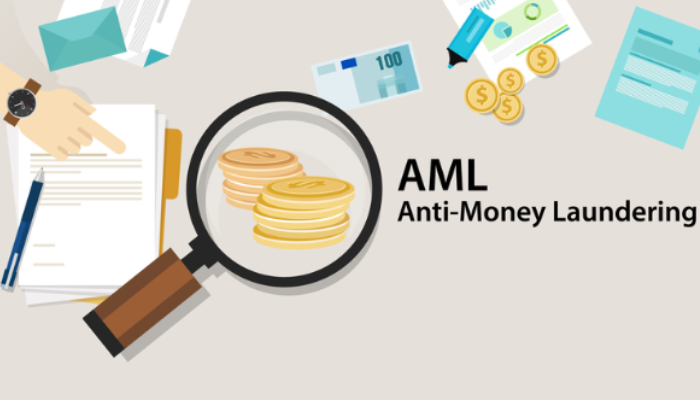INR200 Crore snatched in the name of dummy directors. INR517 crores worth of assets attached with bank loan fraud. Three financial giants fined 3.8 million Singaporean Dollars for money laundering.
When it comes to fleecing money from the market in the name of fraudulent assets, the list of transactions is endless. Financial crimes have affected nearly every nation in the world. Dangerous Illegal activities like terrorism are financial through these fraudsters which put us all at not just financial risk but threats beyond that. If you are caught in the crossfire as a result of dealing with a persona or an organization threatening the world, you will be penalized too.
To save businesses, institutions, and companies from money laundering Anti-Money Laundering (AML) sanction lists are created. These lists can help in the identification of transactions that are associated with illegal activities. The lists contain names of countries, entities, and even individuals involved in illegal activities. When you have access to these lists, you can cross-check the information of any client, partner, or person you are dealing with. This can prevent you from getting into a transaction with a potential offender and save you from becoming a victim of a financial crime.
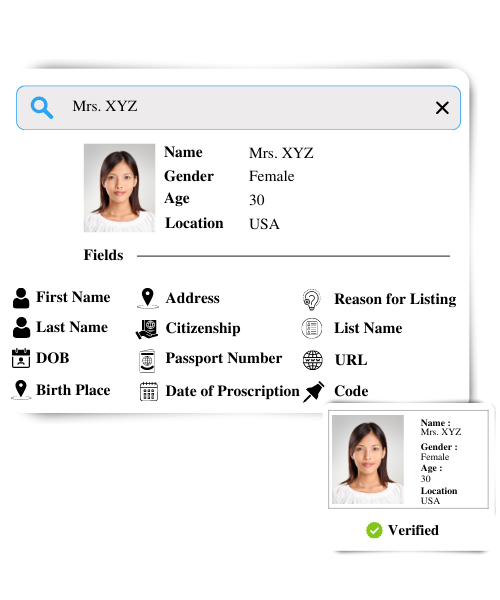
Typically, these lists are created by government regulatory bodies like Financial Action Task Force (FATF) – US and Financial Intelligence Unit – India (FIU-IND) are some organizations that create and maintain these lists nationally. At the global level, United Nations Security Council collates the list of all names sanctioned by different countries. Besides these, many regulatory authorities like the U.S. Office of Foreign Assets Control (OFAC) and the Indian Securities Exchange Board of India also maintain a list of entities and individuals involved in money laundering.
To safeguard organizations from money laundering practices, these regulatory bodies have created compliance procedures under which any organization needs to comply with the AML sanction requirements and implement due diligence procedures. The due diligence involves screening organizations, people, and transactions against the sanctioned AML data. And if this screening reveals any suspicious activity, it has to be reported to respective regulatory authority. But how are these lists made? How are they maintained? How are they reported? How can you prevent yourself from money laundering? Let us find out.
How do AML Sanctions Lists work?
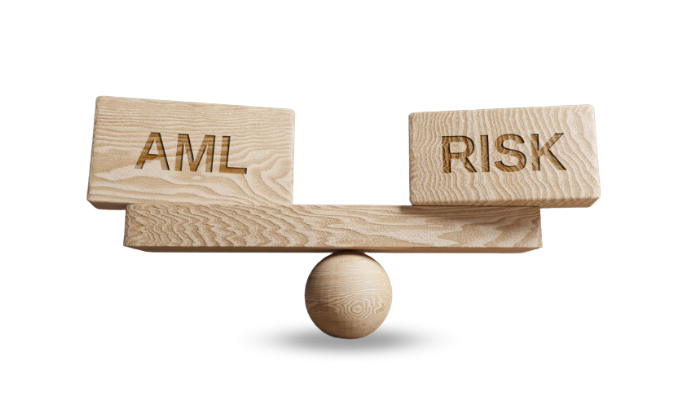
This is not the task of one person or one entity but is a result of collaborative efforts. Regulatory authorities, government companies, intelligence agencies, and organizations globally analyze data they have to identify entities and people, involved in money laundering. Those involved are assessed for the level of financial risks they pose.
After several reviews and legal assessments by intelligence agencies, the identified names are added to the AML data following the procedures defined in the legislative framework followed by a country. Individuals marked in the list are monitored by gathering data about them from multiple intuitions and agencies.
The information collected is then assessed with consideration of potential impact based on which the list is finalized and sanctioned. The sanctioned lists are provided as databases or files that can be fetched through screening software used by financial institutions. Thereafter the activities of the listed entities are continuously monitored and the list keeps getting updated accordingly. Regular updates are notified on the government portals that make these lists available for anyone to download for screening their data for fraud prevention.
Which organizations maintain AML Sanction lists?
Globally, United Nations Sanctions (UN) and OFAC – Specially Designated Nationals (SDN) maintain consolidated AML lists. Alternatively, countries have their own regulatory organizations that maintain AML lists. These include the Department of State, Non-proliferation Sanctions in the US, Office of the Superintendent of Financial Institutions in Canada, UK financial sanctions, Capital Market Board of Turkey Operation Banned List, and Switzerland Consolidated List. In India, the Reserve Bank of India (RBI), Financial Intelligence Unit-India (FIU-IND), Securities and Exchange Board of India (SEBI), and Ministry of Home Affairs (MHA) is involved in maintaining AML sanction lists, identifying suspicious activities, reporting suspicious transactions, and maintaining a list of those involved in terrorist activities respectively.
How does the AML Sanction list look?
In the US, the Office of Foreign Assets Control (OFAC) maintained a “Specially Designated Nationals and Blocked Persons List” (SDN List) that contains names of countries, organizations, entities, and individuals involved in money laundering activities. This includes traffickers, terrorists, Weapons of Mass Destruction (WMD) Proliferators, Foreign Sanctions Evaders, and Rogue Nations.
On the portal of the Financial Intelligence Unit – India, you can find updates on the names identified for their involvement in unlawful activities.
How can organizations comply with AML regulations?
The AML framework provides your organization with certain measures that you have to take in order to comply with AML regulations. These measures include:
- A system for screening your transactions
- Know Your Customer procedure for customer screening against AML sanction lists
- Identification of beneficiaries through due diligence
- Procurement of copies of all identity-related documents
What will happen if we fail to comply?
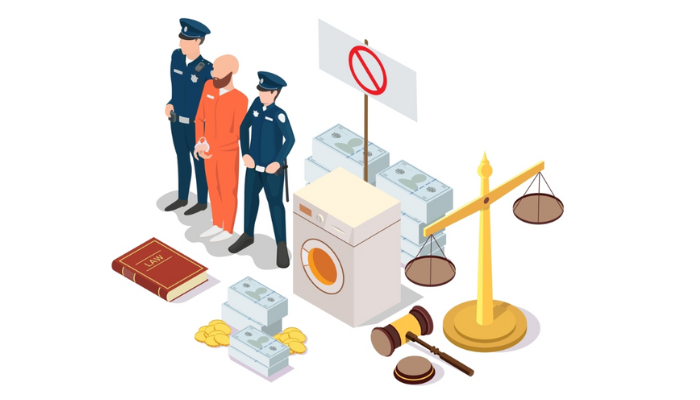
A hefty fine, withdrawal of license, interdict to prevent you from working in the industry, and continuous monitoring by an administrator – you could be facing anything depending on AML policies followed by your country.
Swedbank AB in Riga, Latvia paid $3,430,900 for non-compliance to violations of OFAC sanctions in the US.
Tiger Brokers, a share trading organization from Singapore paid US$546,700 for failing to comply with the Anti-Money Laundering and Countering Financing of Terrorism Act 2009.
IRS officer Karnani was put into custody for accepting unlawful gratification against the Prevention of Corruption Act (PCA).
While the penalty for your inability to comply with these rules might sound scary, what can happen if a real fraud happens as a result of your ignorance can sweep your floor from the ground? It has been estimated that money laundering accounts for around 5% of the global GDP, as suggested in a McKinsey report, in 2019.
Also Read: Why is skip tracing the Key to Preventing Frauds?
How can we screen organizations and individuals against the AML Sanction list?
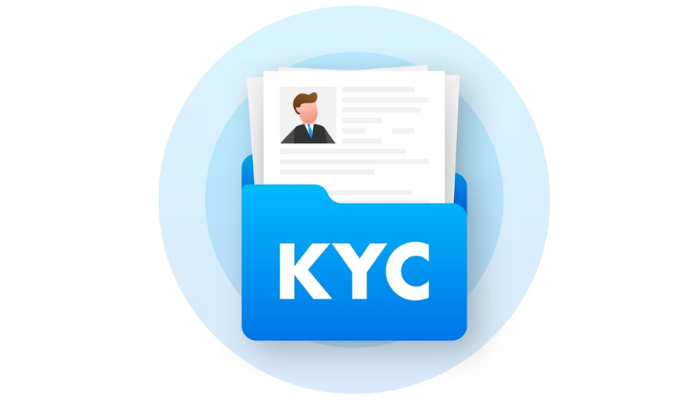
The first step is to collect all identity-related data of individuals and entities, something that can be taken care of in the KYC procedure. Typically, the data you collect includes names, addresses, birth dates, and national identification numbers like SSN, Passport, and Aadhar depending on your country.
Also, check out: The Address Search services by Bizprospex
Upon receiving this information, you then need to download the latest version of an AML sanction list. For screening, you can use compliance or screening software in which you feed your data and the sanction list. Any matches between the two lists would be flagged as suspicious and you will receive an alert from the software.
Then, you can use the name-matching software to filter out variations in names from your records so that you get unique files. To ensure you do not make any errors, a manual check can also be run on the flagged data. If the match is found from the list of politically exposed persons (PEPs), enhanced due diligence may be needed. Any violations confirmed after this must be reported to designated compliance officers or regulatory bodies.
Typically, different countries would have dedicated timelines and procedures for reporting a suspicious transaction. In India, RBI requires organizations to furnish a Suspicious Transaction Report (STR) within 7 days of identifying a transaction as fraudulent. A currency transaction report (CTR) form is to be filled out by a bank that needs to report a transaction reflecting money laundering. For organizations, Suspicious Activity Reports (SAR) are maintained for cash purchases any transactions exceeding $10,000 in a day have to be included.
Money Laundering is a global concern and you can never say that you are 100% safe. However, AML sanction data can rescue you from many potential threats. A simple screening software that compares your data with the AML sanction lists data can help you identify transactions, people, and entities that can likely be fraudsters and could be involved in illegal transactions. If you end up dealing with a fraudster who gets involved in threatening activities like terrorism, you will be caught in the fire and would not be able to save yourself from dire consequences. The alternative might sound tedious and involve you creating and maintaining procedures for data gathering, monitoring, screening, and due diligence but the efforts are worth it if you want to avoid severe outcomes.
To recap, as an organization, you must have a dedicated KYC procedure to collect customer data and perform screening of this data against the AML sanction lists. Review flagged items to ensure that you have appropriately identified fraudsters and then, report them to the authorities. Your reporting would result in actions that would not just prevent you from getting involved but also save other organizations and individuals that might be threatened by these fraudsters if not reported.
The AML sanction lists are continuously updated and thus, it is important that you have access to the latest file. Moreover, any suspicious activity newly identified by your organization can help support the prevention of financial fraud as you can also contribute to money laundering prevention by adding suspicious names to the AML list.
Get the latest AML sanction list, and skip tracing services from BizProspex to keep the fraudsters at bay and keep your company safe.
